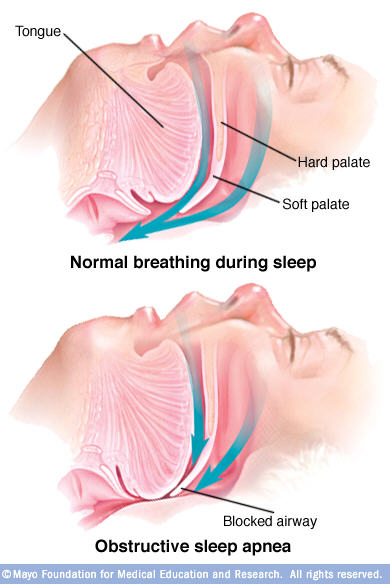-
Health & Wellness
TUESDAY Q & A: Lifestyle choices may help treat mild case of obstructive sleep apnea
 DEAR MAYO CLINIC: How does having sleep apnea affect my health? Are there treatments that I can try for sleep apnea other than a CPAP machine?
DEAR MAYO CLINIC: How does having sleep apnea affect my health? Are there treatments that I can try for sleep apnea other than a CPAP machine?
ANSWER: People who have sleep apnea repeatedly stop and start breathing when they sleep. There are two main types of sleep apnea. The more common form is obstructive sleep apnea, or OSA. It happens when muscles in the back of the throat relax, narrowing the airway and making it hard to take in enough air. Central sleep apnea is less common. It happens when the brain doesn’t send the proper signals to the muscles that control breathing.
OSA can make it difficult to get a good night’s sleep. People with this sleep disorder often do not feel refreshed in the morning. They may wake up with a headache and suffer from fatigue and sleepiness throughout the day. Lack of sleep can affect a person’s mood and the ability to think clearly and concentrate.
Other problems can arise as a result of OSA, too. It may lead to an increase in blood pressure. It can raise your risk for stroke and many types of heart disease. Untreated OSA makes recovery from surgery more difficult. If you have OSA, your risk of being in a motor vehicle accident is higher. Severe cases of OSA may lead to premature death.
To lower the likelihood of having these problems, it is important to have OSA treated. Using a continuous positive airway pressure (CPAP) machine is the most effective treatment. It works by using air pressure to hold the throat open. To use it, you need to wear a mask over your nose while you sleep.
While CPAP is a reliable way to prevent OSA, some people find it uncomfortable at first. Making adjustments to the fit of the mask and giving yourself time to get used to it usually are all that’s needed to successfully use a CPAP machine.
While there are no medications available to treat this sleep disorder, there are lifestyle choices you can make that may help decrease OSA.
First, it is important to get to and stay at a healthy weight. Not all people who have OSA are overweight. But having excess weight is the single biggest risk factor for OSA. Losing even a small amount of extra weight can make OSA less severe. In some cases, getting to a healthy weight can cure OSA completely.
Second, if you smoke, stop. Smoking can make OSA worse in many people. If you need help quitting smoking, talk to your doctor about smoking cessation programs in your area.
Third, keep the amount of alcohol you drink to a minimum, if at all. Alcohol causes the muscles in the back of your throat to relax, increasing symptoms of OSA. The same is true for some medications, such as sleeping pills and tranquilizers. If you take medications, review them with your doctor to see if any of them may be contributing to your OSA.
Fourth, if you have persistent nasal congestion, treatment for that condition may help improve OSA. Talk with your doctor about medication options.
Finally, if you sleep on your back, try sleeping on your side or abdomen instead. When you sleep on your back, your tongue and soft palate may rest against the back of your throat and block your airway.
For cases of mild OSA, these lifestyle changes may be all you need to successfully treat the disorder. For more advanced cases, there are interventions other than CPAP that can be explored, including custom-designed mouth pieces worn at night that hold the lower jaw forward during sleep, as well as a variety of surgical procedures. A number of newer non-CPAP options seeking to open the airway during sleep are in various stages of development, such as specialized nasal valves, oral suction devices and implanted tongue nerve stimulators. A discussion with your health care team would be required to carefully review non-CPAP interventions beyond lifestyle changes. — Eric Olson, M.D., Center for Sleep Medicine, Mayo Clinic, Rochester, Minn.
Related Articles







